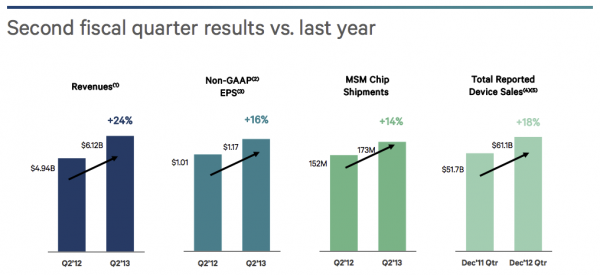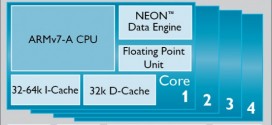Ever since the release of the first 1 Ghz ARM processor, Qualcomm has been riding high in the mobile market, and is currently the leading chip maker. But its ambitions are much higher than the mobile market.
Qualcomm’s revenues grew 24% compared to a year ago, and the shipment of their chips grew by 14%. That’s very healthy growth, when other chip makers aren’t doing so well. But while the mobile market keeps growing, and Qualcomm is taking full advantage of this growth, they also dream about going into the PC market, and take on Intel and AMD head-on.
The Qualcomm Snapdragon S800 chip that has a clock speed of 2.3 Ghz, would be the highest clock speed of an ARM chip we’ve seen in real products so far, and it’s supposed to arrive in a few months. The chip seems destined to be in tablets, and I wouldn’t rule out seeing it in smartphones, too, towards the end of the year.
But I believe Qualcomm also wanted this chip to go into notebooks, which is why it raised the clock speed so high for an ARM chip. Of course, clock speed isn’t everything. And we’ve seen before that a 1.6 Ghz Cortex A15-based Galaxy S4 can score higher than a 1.9 Ghz Qualcomm Snapdragon S600 chip. In the same way, I’d expect even Tegra 4’s 1.9 Ghz Cortex A15 CPU to perform better than the 2.3 Ghz Qualcomm Snapdragon S800.
But whether Qualcomm needed to raise the clock speed this high of their own chips to stay competitive, or not, it’s still making a statement that “ARM chips have arrived” and they are now over 2 Ghz, and can be used in notebooks like Samsung’s ARM Chromebook, too, even if they are lower end ones.
The Snapdragon S800 wouldn’t be the first ARM chip we would see in a notebook, though. We’ve already seen Samsung’s Exynos 5 Dual in the ARM Chromebook, and we’ll increasingly see more Samsung chips in notebooks, too. However, the difference between Samsung and Qualcomm is that Samsung seems to be doing it out of necessity, not ambition.
They wanted to make a low-cost Chromebook with Google, so they went with the most powerful ARM chip they had at a time. I don’t feel that it was their ambition to put ARM chips in notebooks, or anything like that. Qualcomm on the other hand, really wants to get into the notebook market and be a competitor to Intel. They see ARM chips disrupting x86 chips from the bottom-up, and they want to be the first/most aggressive company to do that.
Samsung could be a major competitor in this, too, considering their chips are at least as good as Qualcomm’s, in both CPU and GPU performance, but right now Samsung doesn’t seem that interested in growing their chip market share, and are even happy using Qualcomm’s chips in their own devices. I think that’s a mistake on Samsung’s part, but it is what it is.
Qualcomm also has even further ambitions with their ARM chips in the server market. But that one will be a much tougher market to crack. If any ARM chip maker will succeed there, chances are it will be someone very specialized in the ARM server market like Applied Micro, or Calxeda, or someone who’s very ambitious in dominating that market, like Nvidia. The server market is going to be overcrowded in the first few years, and only the most serious companies are going to see some success.
 TechDomino
TechDomino




